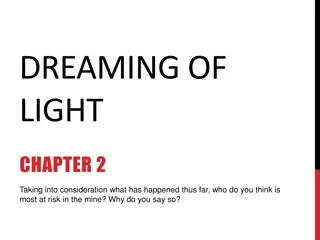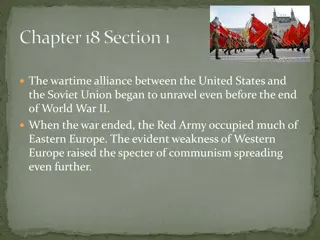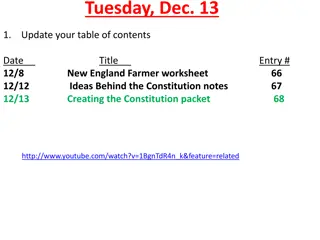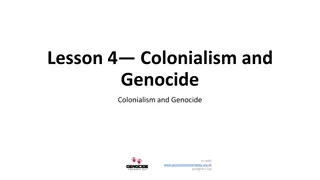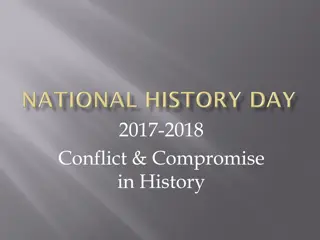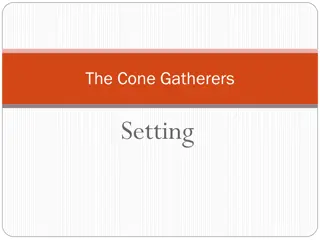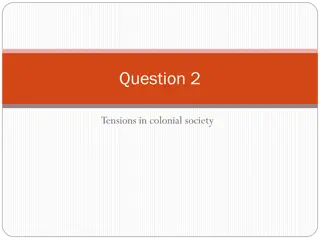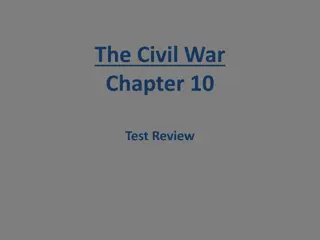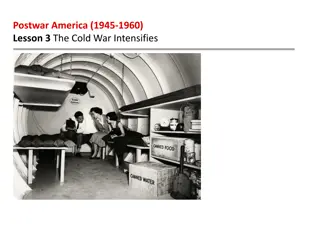Tensions and Compromises in US History
The content covers key events in US history such as the Missouri Compromise, Mexican-American War, Compromise of 1850, and notable figures like John C. Calhoun and Daniel Webster. It highlights the debates and compromises surrounding slavery, territorial disputes, and the balance of power between free and slave states. These events illustrate the growing tensions that ultimately led to the US Civil War.
Download Presentation

Please find below an Image/Link to download the presentation.
The content on the website is provided AS IS for your information and personal use only. It may not be sold, licensed, or shared on other websites without obtaining consent from the author.If you encounter any issues during the download, it is possible that the publisher has removed the file from their server.
You are allowed to download the files provided on this website for personal or commercial use, subject to the condition that they are used lawfully. All files are the property of their respective owners.
The content on the website is provided AS IS for your information and personal use only. It may not be sold, licensed, or shared on other websites without obtaining consent from the author.
E N D
Presentation Transcript
WARM UP: What provisions were included in the Missouri Compromise? What provisions were included in the Missouri Compromise? Draw Draw the consequences on your map along with the boarder between free and slave the consequences on your map along with the boarder between free and slave states. states.
THE MEXICAN WAR: CAUSES AND EFFECTS CAUSES CAUSES United States annexes Texas in 1846 U.S. and Mexico disagree about the Southern Border Mexico refuses to sell California and New Mexico to the U.S. President Polk sends troops to establish the Rio Grande as the U.S.- Mexico border Polk sends troops to California U.S. Declares war on May 13, 1846 U.S. Declares war on May 13, 1846 Effects Effects Rio Grande is established as the U.S.- Mexico border U.S. acquires California and New Mexico Debate over the expansion of slavery intensifies (GROWING PAINS)
HENRY CLAY (KENTUCKY) PRESENTS THE COMPROMISE OF 1850: Congress would admit California as a free state The people of the territories of New Mexico and Utah would decide for themselves whether slavery would be legal. Congress would abolish the sale of slaves, but not slavery, in Washington D.C. Texas would give up claims to New Mexico for $10 million A Fugitive Slave Act would order all citizens of the United States to assist in the return of enslaved people who had escaped from their owners. It would also deny a jury trial to escaped slaves
COMPROMISE OF 1850 WHO SEEMS TO BE GAINING THE UPPER HAND?
JOHN C. CALHOUN- SOUTH CAROLINA SENATOR March 4, 1850- gives a speech in reaction 67 year old senator was ill and asked James Mason of Virginia to read speech for him North s growing population had given it more representatives in the House and more votes in the Electoral College. South had the right to leave the union if necessary Stopping slavery was morally wrong- interfered with their liberty to own enslaved people as property Governments responsibility was to be limited, excepted by all, AND protect property
DANIEL WEBSTER FAVORS COMPROMISE Massachusetts Senator (Northern perspective) Supported Clay s compromise- slavery in New Mexico would never be practical It is our constitutional duty to return fugitive slaves Outraged northern abolitionists- Webster sold out on abolition in an effort to preserve trade! Congress passed the compromise of 1850 South not satisfied- Calhoun s fears momentarily put on hold Fugitive Slave Act made matters worse- many angry in the north Compromise did nothing- only made California free
CHANGES IN POLITICAL PARTIES Decline of the Whig Party Old issues like banking had been resolved Prominent leaders were fading away Continued dominance of the Democratic Party Rise of the Know- Nothings Slavery was not the only major issue Nativism- movement to ensure NATIVE born Americans receive better treatment than immigrants 1846-1854- 3 million Europeans arrived Protestants angry about the rise of Catholics especially from Ireland Irish Potato Famine- 1845-1849- hundreds of thousands of Irish fled to the U.S. In 1854- nativists went public by forming a political organization called the American Party- ANTI Irish Catholics RECEIVED the nickname the Know- Nothings Did well in local elections especially in the urban north
KANSAS NEBRASKA ACT Senator Stephen Douglas of Illinois- conflicting ambitions- NORTHERN DEMOCRAT Wanted Chicago to benefit from the development of the WEST- If Kansas and Nebraska become states, railroads could be built across their land to link Chicago Douglas also wanted to run for president Needed support of the southern democrats Reminder- Missouri Compromise would make Kansas and Nebraska FREE! To win support of Northerners and Southerners, he introduced the Kansas and Nebraska ACT Popular Sovereignty- letting the people in a territory decide whether to allow slavery instead of restricting the decision making power to Congress. Essentially repeal 36 30 parallel line SOUTH obviously happy! Douglas thought the North would be happy as well Possibilities for future development No chance they would vote for slavery on the Northern Great Plains- cotton can t grow there
STEPHEN DOUGLAS SELF INTERESTED? SELLOUT TO THE NORTH? COMPROMISER?
Republican Party is born! Republican Party is born! Disgusted northerners held meetings in Michigan in protest to Kansas and Nebraska Act Formed a new Republican Party This is the same party we have today- Ironically very liberal for its time (b/c of slavery) Stop slavery Repeal the Kansas Nebraska Act and the Fugitive Slave Act
Battle over Kansas! Battle over Kansas! Antislavery groups in the Northeast set up so called Emigrant Aid Societies in 1854- 1855 to send 1200 New Englanders to Kansas to fight against slavery. Free soilers- person dedicated to preventing the expansion of slavery into the western territories By 1855, Kansas had two competing capitals Antislavery capital at Topeka Proslavery capital at Lecompton
DRED SCOTT V. SANDFORD (1857) Dred Scott- enslaved man living in Missouri, filed suit against his owner Argued that b/c he and his wife, Harriet, had once lived in states and territories where slavery was illegal, the couple was in fact free Supreme Court ruled 7-2 against Scott Scott-AND ALL SLAVES- were not citizens and had no right to sue in court Missouri Compromise AND the Northwest Ordinance was Unconstitutional Slaves were the property of their owners and Congress could not deprive people of their property without due process of law according to the 5thAmendment What happened to the federalists and John Marshall? Marshall and the federalist court lasts until 1835 Democratic dominance in the White House leads to VERY CONSERVATIVE judges! Chief Justice Roger Taney No word can be found in the Constitution, which gives Congress a greater power over slave property, or which entitles property of that kind to less protection than property of any other description. The only power conferred (granted) is the power coupled with the duty of guarding and protecting the owner in his rights.
The Lecompton Constitution The Lecompton Constitution 1857- a small proslavery group in Kansas elected members to a convention to write the constitution required to attain statehood. Lecompton Constitution was proslavery Most Kansans were opposed to slavery Refused to vote in referendum b/c both options on the ballot would have protected slavery in Kansas. President Buchanan endorsed the constitution Constitution was killed in a revote For the time being, Kansas remained a territory where slavery was legal according to the Dred Scott decision but in reality, the free soiler majority prohibited slavery.




